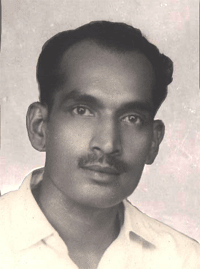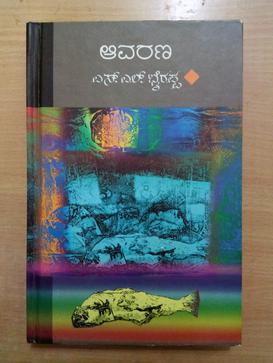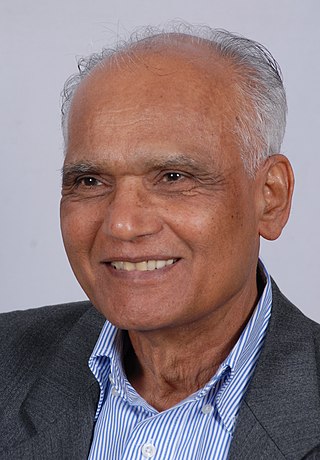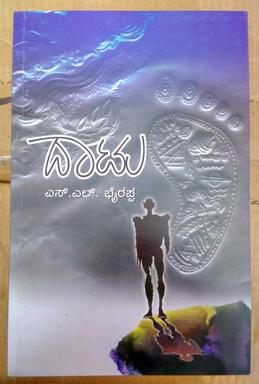
Panikkassery Keshavan "P.K." Balakrishnan was an Indian novelist and critic. A doyen of Malayalam literature, he is best known for his novel, Ini Njan Urangatte, a novel based on Mahabharata as well as a number of critical studies which include Chandu Menon Oru Padanam, Novel Siddhiyum Sadhanayum, Kavyakala Kumaranasaniloode, and Ezhuthachante Kala: Chila Vyasabharatha Patanangalum. His Jathivyavasthayum Kerala Charitravum is a work in social history.

Kota Shivaram Karanth, also abbreviated as K. Shivaram Karanth, was an Indian polymath, who was a novelist in Kannada language, playwright and an ecological conservationist. Ramachandra Guha called him the "Rabindranath Tagore of Modern India, who has been one of the finest novelists-activists since independence". He was the third writer to be decorated with the Jnanpith Award for Kannada, the highest literary honor conferred in India. His son Ullas is an ecological conservationist.

N. S. Madhavan is an Indian writer of Malayalam literature. Known for his novel, Lanthan Batheriyile Luthiniyakal and a host of short stories such as Higuita, Thiruthu, Chulaimedile Shavangal and Vanmarangal Veezhumpol, Madhavan also writes football columns and travel articles. He is a distinguished fellow of Kerala Sahitya Akademi and a recipient of several major awards including Odakkuzhal Award, Kerala Sahitya Akademi Award for Story, Kerala Sahitya Akademi Award for Novel, Muttathu Varkey Award, Mathrubhumi Literary Award, Crossword Book Award and Kerala State Students Federation Sahithyolsav Award.

Thakazhi Sivasankara Pillai, popularly known as Thakazhi after his place of birth, was an Indian novelist and short story writer of Malayalam literature. He wrote over 30 novels and novellas and over 600 short stories focusing on the lives of the oppressed classes. Known for his works such as Kayar and Chemmeen, Pillai was a recipient of the Padma Bhushan, the third highest Indian civilian award. He was also a recipient of the Jnanpith Award, India's highest literary award, awarded in 1984 for the novel Kayar.

The Sahitya Akademi Award is a literary honour in India, which the Sahitya Akademi, India's National Academy of Letters, annually confers on writers of the most outstanding books of literary merit published in any of the 22 languages of the 8th Schedule to the Indian constitution as well as in English and Rajasthani language.

Lalithambika Antharjanam was an Indian author and social reformer best known for her literary works in the Malayalam language. She was influenced by the Indian independence movement and social reform movements among the Nambuthiri community and her writing reflects a sensitivity to the women's role in society, in the family and as an individual.

Chandrashekhara Basavanneppa Kambara is a prominent Indian poet, playwright, folklorist, film director in Kannada language and the founder-vice-chancellor of Kannada University in Hampi also president of the Sahitya Akademi, country's premier literary institution, after Vinayak Krishna Gokak (1983) and U.R. Ananthamurthy (1993). He is known for effective adaptation of the North Karnataka dialect of the Kannada language in his plays, and poems, in a similar style as in the works of D.R. Bendre.
Moorkkanaat Krishnankutty Menon, better known by his pen name Vilasini, was an Indian writer from Kerala who wrote in Malayalam-language. He is the author of India's longest novel, Avakasikal, for which he won the Kendra Sahitya Akademi Award in 1981 and Vayalar Award in 1983. His first novel Niramulla Nizhalukal won the Kerala Sahitya Akademi Award in 1966.

Parva (Epoch) is a novel written by S. L. Bhyrappa in the Kannada language. It is a retelling of the Sanskrit epic Mahabharata, narrated through the personal reflections of the principal characters. The novel is widely acclaimed as a modern classic. Parva is among Bhyrappa's most widely debated and popular works and is considered by many to be his greatest.

Aavarana is a 2007 Kannada novel by novelist S. L. Bhyrappa. Aavarana means enveloping or covering something. This novel deals with the historical character Timurid Emperor Aurangazeb. Aavarana was sold out even before its release in February 2007. The novel went on to create a record in the Indian literary world by witnessing 10 reprints within five months of its release.

K. R. Meera is an Indian author and journalist, who writes in Malayalam. She was born in Sasthamkotta, Kollam district in Kerala. She worked as a journalist in Malayala Manorama but later resigned to concentrate more on writing. She started writing fiction in 2001 and her first short story collection Ormayude Njarambu was published in 2002. Since then she has published five collections of short stories, two novellas, five novels and two children's books. She won the Kerala Sahitya Akademi Award in 2009 for her short-story, Ave Maria. Her novel Aarachaar (2012) is widely regarded as one of the best literary works produced in Malayalam language. It received several awards including the Kerala Sahitya Akademi Award (2013), Odakkuzhal Award (2013), Vayalar Award (2014) and Kendra Sahitya Akademi Award (2015). It was also shortlisted for the 2016 DSC Prize for South Asian Literature.

Santeshivara Lingannaiah Bhyrappa is an Indian novelist, philosopher and screenwriter who writes in Kannada. His work is popular in the state of Karnataka and he is widely regarded as one of modern India's popular novelists. His novels are unique in terms of theme, structure, and characterization. He has been among the top-selling authors in the Kannada language and his books have been translated into Hindi and Marathi which have also been bestsellers.

Sumathendra Raghavendra Nadig was an Indian professor and writer in Kannada. Nadig came upon the literary scene as a prominent modern poet in the 1960s. He was a close associate of Gopalakrishna Adiga, the leader of the modernist movement.
Dr. H. R. Vishwasa is a Sanskrit scholar residing in Mangalore, India. He won a Sahitya Akademi Translation Prize in 2010 for translating S. L. Bhyrappa's Kannada novel Aavarana into Sanskrit.

A. Sethumadhavan, popularly known as Sethu, is a Malayalam fiction writer. He has published more than 35 books. He won the Kendra Sahitya Akademi Award in 2007 for the work Adayalangal. He received the Kerala Sahitya Akademi Awards in 1982 and 1978 for his works Pandavapuram and Pediswapnangal; and Vayalar Award for Adyalangal in 2006. He also won Odakkuzhal award for his novel Marupiravi. Sethu's other literary works include Velutha Koodarangal, Thaliyola, Kiratham, Niyogam, Sethuvinte Kathakal and Kaimudrakal. He also served as the chairman and CEO of the South Indian Bank. In 2022, he won the Ezhuthachan Puraskaram, highest literary honour of the Kerala Sahitya Akademi.

Matadana(meaning: voting) is a 1965 novel written by the famous Kannada writer, philosopher, thinker S L Bhyrappa. An award winning Kannada movie Mathadana based on this novel, which was directed by T N Seetharam secured 'Best Regional Film' award at 47th National Film Awards. Matadana reveals the caste based politics and other dynamics that grip the democratic institution of ballot box in India.
Kanhu Charan Mohanty was an Indian Odia language novelist who wrote fifty-six novels in a career spanning over six decades from 1930 to 1985. He is considered "one of the most popular and celebrated novelists of Odisa". Mohanty was awarded the Sahitya Akademi Award in 1958 for his novel, Kaa, published in 1956, and was one of the fellows of the Sahitya Akademi. Mohanty died on 6 April 1994 at the age of 87.

S. Hareesh is an Indian writer, translator and screenwriter of Malayalam literature and cinema. He is best known for his short stories and his acclaimed but controversial debut novel, Meesa, which explores caste in Kerala in the mid-20th century. The novel, initially serialized in the Mathrubhumi weekly, was withdrawn after protests by right-wing Hindutva groups and caste-community organizations for "maligning Hindu women and temple priests". It was later published as a full novel by DC Books. Hareesh is the recipient of several honours including the Kerala Sahitya Akademi Award for Novel and the Geetha Hiranyan Endowment of the Kerala Sahitya Akademi. In November 2020, the English translation of Meesa, titled Moustache, was selected for the JCB Prize for Literature, the Indian literary award with the highest prize money.

R. Narayana Panickar was an Indian essayist, playwright, translator, lexicographer, novelist and historian of Malayalam. He was credited with over 100 books but the best known among them are the seven-volume work, Kerala Bhasha Sahitya Charitram, a comprehensive history of Malayalam literature up to 1951 and Navayuga Bhasha Nighantu, a lexicon. He also wrote a number of novels and translated several works including Purananuru, Akanaṉūṟu and Silappatikaram. He was also a historian and published works such as Thiruvithamkoor Charitram and Kerala Charitram. Sahitya Akademi honoured him with their annual award in 1955.

Hema Naik is an Indian Konkani writer. She is a recipient of the Sahitya Akademi Award and is the wife of the Konkani writer Pundalik Naik. She publishes books under the banner of Volvoi-based Apurbai Prakashan.

















